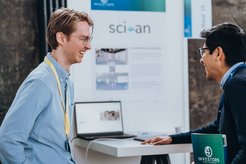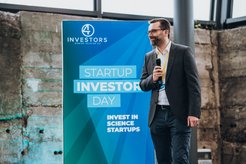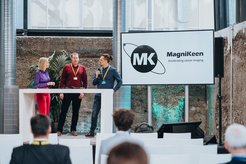4Investors Day
Max Planck Innovation presents ten MPG start-ups at new event format for investors
On 29 March, 39 start-up teams and young companies from the four large German non-university research institutions Fraunhofer-Gesellschaft, Leibniz and Helmholtz Associations and the Max Planck Society presented their business ideas together for the first time in front of numerous investors. Max Planck Innovation nominated ten selected start-up projects from the fields of Life Sciences and Deep Tech from the Max Planck Society to pitch on the stages of the Munich "coal bunker". For the first time, the four major non-university research institutions joined forces for the new event format.

The first edition of the event attracted enormous interest. "Intensive discussions between investors and teams and many follow-up appointments arranged: The joint event project with the Fraunhofer-Gesellschaft, the Leibniz Association and the Helmholtz Association shows that a large number of investors are also interested in technology-based start-ups in Germany," says Florian Kirschenhofer, co-initiator of the Investor Day and Start-up and Portfolio Manager at Max Planck Innovation. On the Deep Tech and Life Sciences stage, teams pitched to interested venture capitalists, business angels, and family offices throughout the afternoon.
At the surrounding booths, teams engaged in one-on-one exchanges with investors. "As a deep tech investor with an early-stage focus, we are looking for high-tech and life sciences start-ups that we can actively support over the coming years. Events of this kind are ideal for establishing contact with start-ups but also for gaining a quick overview of current topics," explains Patrizia Schützenhöfer, CEO of the venture capital investor Occident.
From the first meeting with the start-up coach to the pitch stage in Munich

A total of 39 teams presented business models - ten of which have their origins in basic research at a Max Planck Institute. One example is the start-up MagniKeen. Based on proprietary research results at the Max Planck Institute for Multidisciplinary Natural Sciences, the team develops novel molecules and processes. These make it possible to use the body's own substances as MRI contrast agents. A possible first field of application is imaging in the early diagnosis of prostate cancer. The start-up is thus closing a gap in the market and is cheaper and faster than usual radiotracer procedures. "For us, it is the first time at a pitch event of this magnitude. We need an initial investment of about four million euros. The resources will mainly go into a necessary approval process," says Henning Schroeder, founder of the start-up MagniKeen. Since the beginning of the project, MagniKeen has been accompanied by start-up & portfolio managers from Max Planck Innovation.
In addition to individual coaching and participation in the incubation program MAX!mize, Investor Day is another offer in the service spectrum of the technology transfer unit. Another example is Cutanos GmbH, which was spun off in 2021. The company develops antigen-specific vaccines as well as new treatments for autoimmune diseases. "For our next financing round of 8.5 million, we would like to attract investors who will support the successful development of Cutanos so far," says Ulrich Platte, Managing Director & CFO of the start-up Cutanos, a spin-off of the Max Planck Institute of Colloids and Interfaces.
Venture capitalists seek technologies – start-ups seek money

For start-ups seeking venture capital to conduct a seed or Series A financing round, contact with investors is crucial to success. Research-intensive spin-offs with high expenses in product development need outside capital. This is because, among other things, due to lengthy studies and approval procedures, the need for money on the way to a marketable product is very high. In addition to early-stage public funding, start-up teams also need access to venture capital from venture capitalists, family offices or business angels. Stimulating conversations and networking until late into the night of 29 March showed that one or the other Max Planck start-up team has come a step closer to making successful contact with investors.


